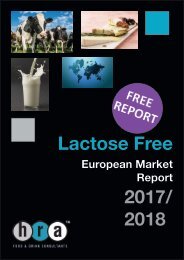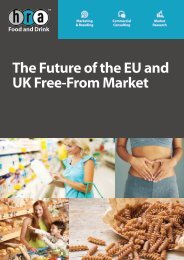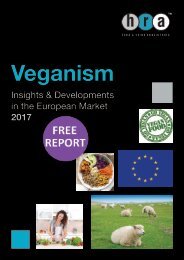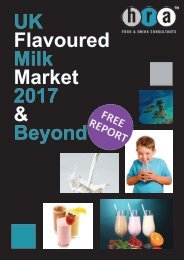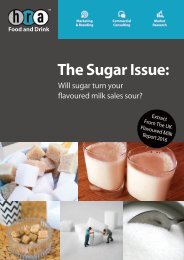FREE-UK-Flavoured-Milk-Report-2016-2017
The backdrop to the UK flavoured milk market is one of relentless change. The removal of the EU milk quotas, the transition to a Western-type diet by emerging economies, the UK sugar debate and the booming sports nutrition industry are all aspects of change that create both challenges and opportunities for the UK flavoured milk market. HRA Food and Drink Marketing has developed this report as a map to guide industry stakeholders. Although volume growth in 2014 was slightly lower than in previous years, the flavoured milk market still has plenty of room for product innovation and development. Overall, we expect the UK flavoured milk market to continue to grow over the medium term, but not without improving its nutritional profile. The sugar debate reached new heights when, in October 2015, Public Health England released a document suggesting Government intervention in the form of a sugar tax (levy). As a consequence, product reformulation has become a priority for all serious players in the market.
The backdrop to the UK flavoured milk market is one of relentless change. The removal of the EU milk quotas, the transition to a Western-type diet by emerging economies, the UK sugar debate and the booming sports nutrition industry are all aspects of change that create both challenges and
opportunities for the UK flavoured milk market.
HRA Food and Drink Marketing has developed this report as a map to guide industry stakeholders. Although volume growth in 2014 was slightly lower than in previous years, the flavoured milk market still has plenty of room for product innovation and development.
Overall, we expect the UK flavoured milk market to continue to grow over the medium term, but not without improving its nutritional profile. The sugar debate reached new heights when, in October 2015, Public Health England released a document suggesting Government intervention in the form of a sugar tax (levy). As a consequence, product reformulation has become a priority for all serious players in the market.
Create successful ePaper yourself
Turn your PDF publications into a flip-book with our unique Google optimized e-Paper software.
<strong>UK</strong>#FLAVOURED#MILK#<strong>2016</strong>217#<br />
#<br />
Temporary Veganism: There are a growing number of people are trying out<br />
a vegan diet for 7 or 30 days according to the Vegan Society. They reported<br />
a 40% increase in people signing up to its temporary menu at the start of<br />
2013 compared to 2012. The media and celebrities have played a big part in<br />
this with stars such as Beyonce To claiming Gain Access to have tried a vegan diet for 22<br />
days for a ‘spiritual and physical cleanse’.<br />
Purchase The Full<br />
<strong>Report</strong> Now<br />
These consumers who are flexible in their consumption of animal-derived<br />
products are part of a growing group of ‘flexitarians’. These people do not<br />
commit to a full vegetarian or vegan diet but try to reduce their consumption<br />
of animal products. The Meat Free Monday campaign launched by Paul,<br />
Mary and Stella McCartney is one example of how small steps towards<br />
vegetarianism are being taken by mainstream consumers.<br />
Health Concerns: The rise in avoiding meat products is largely down to<br />
health concerns, particularly following the World Health Organisation’s<br />
International Agency for Research on Cancer’s October 2015 report claiming<br />
50g of processed meat a day increases the risk of colorectal cancer by 18%.<br />
The resulting decline in red meat and processed meat sales illustrates the<br />
impact negative media attention can have on consumers’ views. While red<br />
and processed meat is currently the focus of health organisations, there is a<br />
danger for dairy products if it is the next target.<br />
To Gain Access<br />
There is a section of consumers who avoid dairy for health concerns. The<br />
paleo diet for example forbids Purchase the consumption The Full of dairy products. With<br />
humans the only species that consumes <strong>Report</strong> Now milk in adulthood and the only<br />
species that consumes milk from another animal, paleo advocates say dairy<br />
is not necessary for optimal health and consumption in adults in unnatural.<br />
Some findings that countries with low dairy consumption have low rates of<br />
osteoporosis and vice versa have also called into question age-old<br />
assumption about dairy being good for bone health. Despite several studies<br />
supporting # the association between dairy consumption and improved bone<br />
health, evidence suggesting otherwise be damaging for the industry when<br />
quoted as fact by the media.<br />
Animal Welfare: Another factor which is leading more people to adopt vegan<br />
attitudes is concerns over animal welfare. With the internet making<br />
information more accessible, various videos and documentaries criticising<br />
the meat and dairy industries for poor animal welfare standards have<br />
emerged. Hidden camera footage showing To Gain abuse Access or sub-standard conditions<br />
can be extremely damaging to the Purchase industry. Take The the Full example of the video<br />
showing bobby calves suffering abuse in New Zealand which saw significant<br />
media attention in December 2015.<br />
<strong>Report</strong> Now<br />
Environmental Concerns: While health and animal welfare concerns tend to<br />
be the major reasons for adopting vegan attitudes, environmental concerns<br />
© <strong>2016</strong> Teepee Limited. All Rights Reserved.<br />
171



